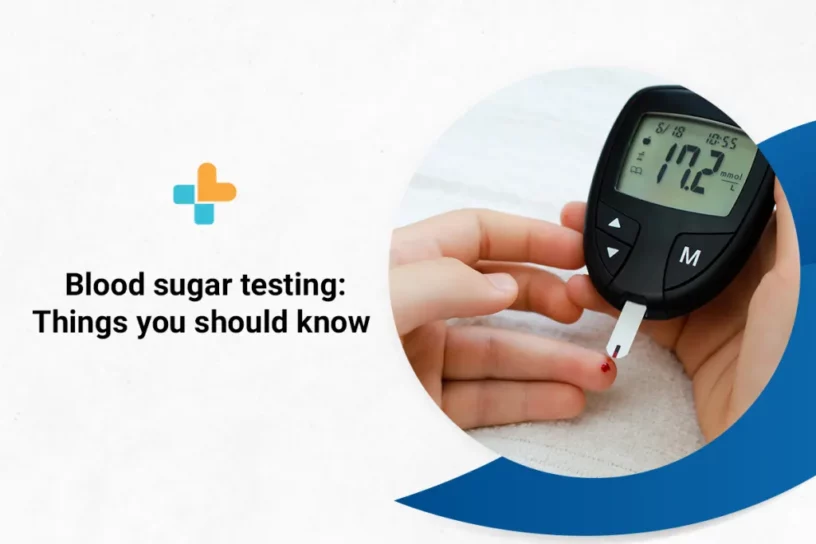The human body transforms carbohydrates from food into glucose to absorb as energy. If a person has too much or too little glucose in their blood, it indicates a significant medical condition. The amount of glucose, or sugar in your blood is measured by a blood glucose(sugar) test.
If you’re someone who is suspected of having abnormal levels of sugar in your blood (diabetes when it’s too high, and hypoglycemia when it’s too low), your doctor will suggest any of the following blood sugar tests to confirm diagnosis.
Tests to check blood glucose levels
There are several tests that measure your blood sugar levels, but we’ve listed down some of the simplest and most commonly used tests –
Random blood sugar test
If diabetes is suspected, a blood sample collected at any moment can be used as a test. Diabetes is diagnosed when the blood sample contains sugar levels of 11.1 mmol/L or higher. To confirm the diagnosis, a fasting blood glucose test may be performed.
Fasting blood sugar(glucose) level
As the name suggests, this test measures your blood sugar levels after an overnight fast. In other words, before a fasting blood glucose test, you can’t eat or drink anything except water for 8-10 hours. A fasting blood sugar level of 99 mg/dL or less is considered normal, while 100 to 125 mg/dL implies prediabetes. Anything above 126 mg/dL indicates diabetes.
A1C Test/ HbA1c test.
It is a blood test used to identify diabetes type 1 and type 2. If you already have diabetes, you can take the test to see how effectively you’re controlling your blood sugar levels. The results of an A1C test indicate your average blood sugar level over the previous two to three months. The level is normal if the findings are less than 5.7 per cent, 5.7% to 6.4% is diagnosed as prediabetes, and 6.5% or higher on two separate tests indicates diabetes.
Tests to monitor blood sugar at home
A majority of diabetics must monitor their blood sugar(glucose) levels on a regular basis. Blood sugar levels reveal how well the condition is managed and help in significantly reducing the likelihood of developing conditions like kidney disease or vision loss.
If you have been recently diagnosed with diabetes, this might seem like a hassle. But being conscious of your blood sugar numbers will help you and your doctor determine what’s working and what’s not, in terms of treatment and medicines.
Blood glucose monitor
A blood glucose monitor comes with a little, sharp needle (called a lancet) which is used to prick the finger. The drop of blood drawn is placed on the test strip. The test strip is then inserted into a blood glucose metre that displays your blood sugar level. You can get the readings in less than 15 seconds and also save the information for later use.
You will also find newer metres that test sites other than your fingertips like your upper arm, forearm, and the base of the thumb and thigh.
Continuous glucose monitoring system
People with diabetes who wish to track their blood glucose levels around the clock can also use a continuous glucose monitoring device (CGM). These devices have a compact, easy-to-insert sensor that you wear for 14 days before being replaced. The sensor contains an adhesive surface that allows it to stick to your skin. The CGM also includes a transmitter that can be integrated into the sensor or used as a separate device. Some CGMs last longer than 14 days, but these have to be implanted beneath your skin by a doctor.
In conclusion, if you’re someone living with diabetes, work closely with your healthcare provider to track and monitor your blood sugar levels. It will also help your doctors figure out which test is best for blood sugar for you. If the cost is a problem, there are several insurance plans that can help you out.
Ayu Health in Bangalore have partnered with over 100 insurance providers across India to provide quick cashless services for all treatments. If you have trouble reaching your blood sugar goals, don’t lose hope. Contact the best healthcare team atAyu Health and take control of your life today!
If you need additional resources or would like to speak with a professional, feel free to contact us right away at +91 636-610-0800 or book an appointment on our website. Our expert team is here to assist and support you every step of the way.
Our Hospital Locations
General Surgery Hospitals in Chandigarh | General Surgery Hospitals in Bangalore | General Surgery Hospitals in Jaipur | General Surgery Hospitals in NCR | General Surgery Hospitals in Hyderabad
Our Doctors
General Surgery Doctors in Chandigarh | General Surgery Doctors in Bangalore | General Surgery Doctors in Jaipur | General Surgery Doctors in NCR | General Surgery Doctors in Hyderabad
References
Tests for Blood Sugar (Glucose) and HbA1c | Patient
How to Test Your Blood Sugar Levels
Home Blood Sugar & Glucose Testing Methods for Diabetes
Know Your Blood Sugar Numbers: Use Them to Manage Your Diabetes | NIDDK




